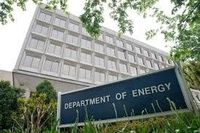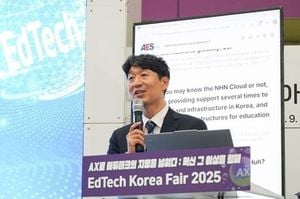SEOUL, April 16 (Yonhap) -- In a significant diplomatic engagement, Acting President Han Duck-soo announced on Wednesday that South Korea and the United States are actively working towards a "win-win" solution regarding the contentious issue of U.S. reciprocal tariffs on imports from South Korea. This statement came during a breakfast meeting with Maryland Governor Wes Moore, who is in South Korea leading a trade delegation.
According to Han's office, the two nations are engaged in ongoing communication, cooperation, and negotiations at various levels, including ministerial discussions, to resolve the tariff disputes amicably. "He explained that the United States and South Korea are communicating, cooperating, and negotiating at the ministerial and other levels to find a win-win solution, and requested Gov. Moore's interest," the office stated in a press release.
Governor Moore expressed optimism regarding the negotiations, emphasizing the critical nature of the South Korea-U.S. relationship and his commitment to support the discussions. His remarks reflect the importance both countries place on maintaining strong economic ties.
During the meeting, Han highlighted the increasing collaboration between Maryland and South Korea, particularly in sectors like quantum technology, biotechnology, pharmaceuticals, and space. "(Han) said he hopes South Korea and Maryland will continue to lead the development of future industries together," the office reported.
Moore assured Han of his dedication to fostering continued cooperation, acknowledging the significant contributions that South Korean businesses have made to Maryland's political stability, economic growth, and social diversity. He specifically noted the role of South Korean firms at the forefront of innovation in various sectors.
In a broader context, the South Korea-U.S. alliance remains a focal point of both leaders' discussions. Han and Moore reaffirmed their commitment to strengthening this alliance, recognizing its vital role in regional stability and economic prosperity.
However, the backdrop to these discussions is marked by recent developments regarding South Korea's designation as a "sensitive country" by the U.S. Department of Energy, which officially took effect on April 15, 2025. This designation comes despite South Korea's requests for its removal and adds another layer of complexity to the ongoing negotiations.
The Sensitive Country List (SCL) guideline, adopted under the Biden administration, places South Korea in the lowest tier, labeled "Other Designated Countries." As a result, South Korean researchers must now submit documentation at least 45 days in advance for approval before visiting U.S. Department of Energy-affiliated laboratories. Similarly, U.S. researchers will face security procedures when visiting South Korean research institutions.
Despite these restrictions, a South Korean official indicated that the U.S. has assured them that the designation would not hinder bilateral research and development cooperation. Both nations have agreed to continue discussions through a working-level consultation body that includes South Korea’s Ministry of Science and ICT, the Ministry of Trade, Industry and Energy, the Ministry of Foreign Affairs, and the U.S. Department of Energy.
Nevertheless, there are concerns about the timeline for lifting the designation. U.S. officials are reportedly undergoing internal procedures to assess whether the conditions that prompted the designation have been resolved. Observers note that the prospect of the U.S. lifting the designation in the near term appears slim, with no clear timeline provided.
Moreover, there are apprehensions that U.S. President Donald Trump may leverage this sensitive designation as a bargaining chip in future trade negotiations, particularly concerning reciprocal tariffs. This potential strategy could complicate the already intricate dynamics between the two countries.
In summary, as South Korea and the United States navigate the complexities of trade negotiations and diplomatic relations, the emphasis on cooperation and mutual benefits remains paramount. The commitment to resolve tariff disputes while addressing sensitive designations reflects the intricate balance both nations seek to maintain.
The meeting between Han and Moore underscores the importance of fostering strong ties, not only for economic growth but also for the stability of the broader region. As both countries continue their discussions, the outcomes will likely have significant implications for future collaboration and mutual prosperity.




